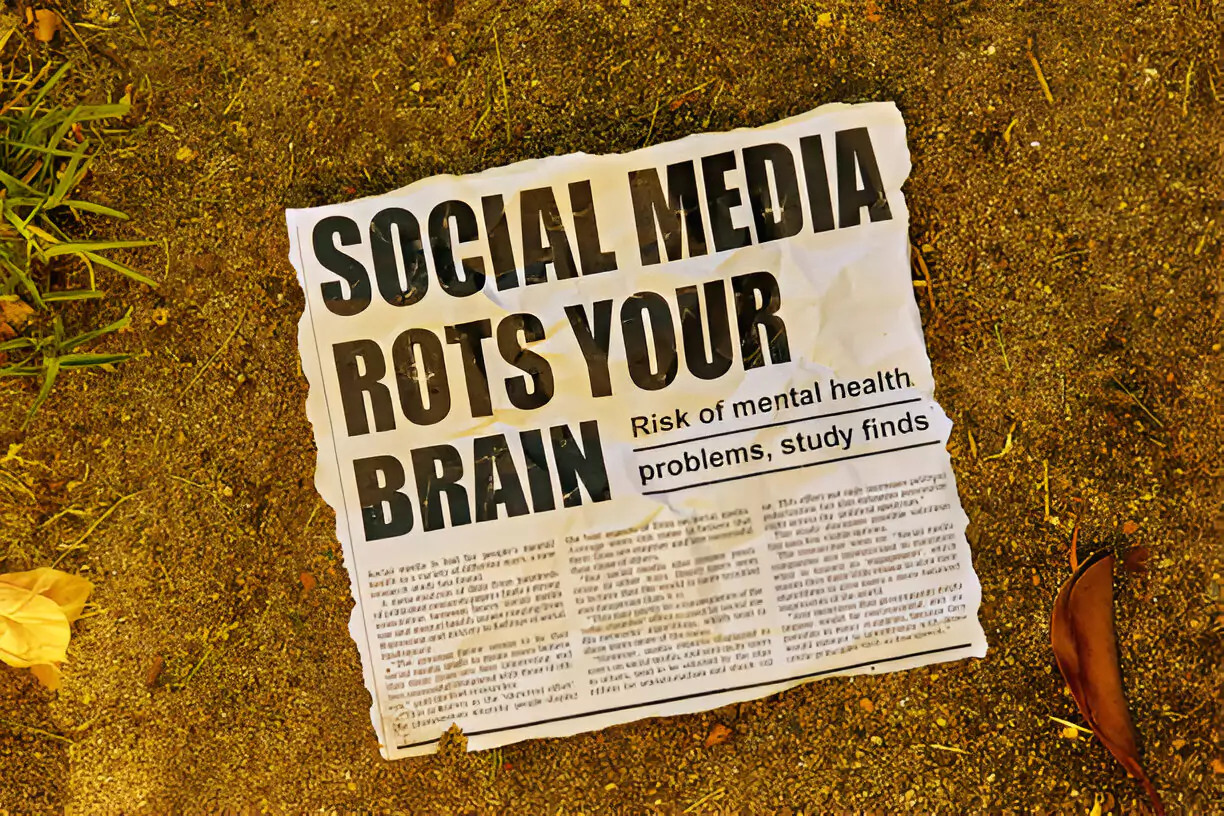“Brain rot.” The phrase itself feels like something your sarcastic best friend might throw out after your fifth hour of scrolling TikTok. While it sounds like a joke—and honestly, it’s used as one most of the time—there’s a kernel of truth buried in the humor. For many Gen Zers, “brain rot” perfectly describes that fried, foggy, can’t-focus-to-save-your-life feeling that comes from living in a world glued to screens.
And let’s be real: it’s not just about social media. It’s the constant notifications, the never-ending streams of content, and the insidious way digital life has become, well, life. The irony? While everyone’s busy debating AI ethics and climate change, we’re quietly ignoring the fact that our collective attention spans have shriveled to the size of a Snapchat streak.
So, what exactly is brain rot? How did it become the unofficial anthem of Gen Z? More importantly, is there a way out without tossing your phone into a lake? Let’s dive in.
What Is “Brain Rot”?
First, let’s clear this up: brain rot isn’t a medical condition (though it sometimes feels like it should be). It’s the term du jour for the mental fuzziness, reduced focus, and general overstimulation caused by excessive digital consumption. Think of it as mental burnout, but instead of work emails and deadlines, it’s TikTok dances, Reddit rabbit holes, and endless Instagram stories.
At its core, brain rot happens when your brain gets stuck in a digital feedback loop. Here’s how it works:
- Dopamine Overload: Every like, comment, and notification triggers a small dopamine rush. It feels great, but over time, your brain gets hooked on these quick hits of pleasure, leaving you craving more and finding offline activities…boring.
- Attention Fragmentation: The constant barrage of content trains your brain to process information in short bursts. Long-form anything—whether it’s a novel or a conversation—feels almost impossible to focus on.
- Emotional Exhaustion: Between doomscrolling the news and comparing yourself to that influencer who “accidentally” went viral again, your emotions are on a rollercoaster that never seems to stop.
Why Is Gen Z More Vulnerable?
Here’s the thing: every generation has its distractions. Baby boomers had TV, millennials had the early internet (remember Neopets and MSN Messenger?), but Gen Z? They’ve been swimming in the deep end of the digital pool since birth. Here’s why this matters:
1. They’re Digital Natives
Unlike millennials, who at least remember flip phones and landlines, Gen Z doesn’t know a world without smartphones, Wi-Fi, and 24/7 connectivity. From day one, they’ve had instant access to everything, from memes to news to niche communities. While that’s cool in many ways, it also means they’ve never had to wait for anything—a breeding ground for impatience and overstimulation.
2. Social Media Is Their Stage
For Gen Z, social media isn’t just a tool; it’s a lifestyle. It’s where they build their identity, maintain friendships, and, yes, post those aesthetic coffee shots. But with that comes the pressure to perform. Likes and comments aren’t just fun—they’re validation. And let’s not even get started on FOMO (fear of missing out). Every scroll can feel like a reminder that someone else is living a more exciting life.
3. The Content Firehose
TikTok. Instagram. YouTube. Snapchat. The platforms are endless, and the content never stops. Algorithms are designed to serve you exactly what you want, even before you know you want it. It’s like trying to sip from a firehose—you’re constantly bombarded with information, and your brain barely has time to breathe.
Signs You’ve Got Brain Rot
Okay, so you might be thinking, Am I rotting my brain? If you’re Gen Z—or just someone who’s a little too attached to their phone—here are some telltale signs:
1. You Can’t Focus for Long
Ever start a Netflix movie and check your phone halfway through because even that’s too slow? Brain rot shortens your attention span, making it harder to enjoy things that don’t provide instant gratification.
Fun Fact: Researchers say the average attention span is now 8 seconds—shorter than a goldfish. That’s right. We’ve been outpaced by a fish.
2. You Feel Mentally Drained for No Reason
You didn’t run a marathon. You didn’t solve world hunger. So why do you feel like you’ve been hit by a bus? Brain rot can leave you emotionally and mentally exhausted after hours of scrolling.
3. Offline Activities Feel…Boring
Remember when you used to enjoy hobbies like reading, drawing, or playing sports? If the thought of picking up a book now feels like a chore, social media might be hijacking your dopamine system.
4. You’re Constantly Multitasking (and Failing)
Listening to a podcast while texting your friend and checking TikTok? You might feel productive, but science says otherwise. Multitasking divides your attention, meaning you’re doing everything just okay instead of anything well.
5. Sleep? What’s That?
If late-night scrolling is cutting into your sleep, welcome to the club. Blue light and overstimulation can wreak havoc on your circadian rhythm, leaving you tired and cranky the next day.
How Did We Get Here?
So, how did brain rot go from a joke to a generational problem? Let’s connect the dots:
1. The Algorithm Knows You Better Than You Do
Algorithms aren’t just “smart”—they’re creepy smart. They know your likes, habits, and even what kind of dog videos you’ll binge at 2 a.m. They’re designed to keep you hooked, creating an endless loop of dopamine hits.
2. FOMO: The Ultimate Bait
Social media thrives on FOMO. If you’re not posting, are you even living? And if you’re not scrolling, what amazing moments are you missing? This fear keeps you coming back, even when you’d rather unplug.
3. The Pandemic Effect
Let’s be real: COVID-19 threw gasoline on the brain rot fire. Stuck at home with nowhere to go, many of us turned to our screens for connection, entertainment, and distraction. Two years later, those habits are hard to break.
How to Fight Back Against Brain Rot
The good news? It’s never too late to reclaim your focus and mental clarity. Here are some tips to help you detox your brain without going full-on “off the grid”:
1. Set Boundaries
- Time Limits: Use screen-time apps to track and limit your daily usage.
- No-Phone Zones: Keep your phone out of reach during meals or before bed.
- Mute Notifications: Trust me, you don’t need a ping every time someone likes your meme.
2. Embrace the “Slow Life”
Train your brain to enjoy slower, more meaningful content. Read a book, watch a documentary, or even try journaling. At first, it’ll feel weird—like trying to eat veggies after a month of fast food—but stick with it.
3. Rediscover Offline Joy
Remember hobbies? Those things we did before phones ruled our lives? Pick up painting, gardening, or even just taking walks without your earbuds. Rediscovering offline joy reminds you there’s more to life than a screen.
4. Schedule Detox Days
No, you don’t need to delete Instagram (unless you want to), but taking a day off can work wonders. Use that time to reconnect with friends IRL or even just nap guilt-free.
5. Sleep Smarter
Set a “screen curfew” an hour before bed. Use this time to wind down, read, or practice mindfulness. Bonus points if you charge your phone in another room.
The Gen Z Call to Action
Brain rot might feel like a badge of honor for Gen Z, but it doesn’t have to be a permanent state of mind. By setting boundaries, finding balance, and embracing life beyond the screen, it’s possible to reclaim your focus, creativity, and mental clarity.
So next time you find yourself scrolling mindlessly at 2 a.m., ask yourself: Is this adding to my life, or just stealing my time? The answer might surprise you—and inspire you to put the phone down. Your brain deserves better, and so do you.
FAQs: Brain Rot and Gen Z
Is brain rot a real medical condition?
No, “brain rot” is not a medical term. It’s a colloquial way to describe the mental fog, lack of focus, and overstimulation caused by excessive digital consumption.
Can brain rot affect older generations too?
Absolutely. While Gen Z may be most vulnerable due to their lifelong exposure to digital devices, anyone who spends too much time on screens can experience similar symptoms.
Can gaming contribute to brain rot, or is it just social media?
Gaming, like social media, can contribute to brain rot if it’s excessively overstimulating or disrupts balance in daily life. However, not all gaming is harmful; it depends on duration and purpose.
Is there any positive effect of the pandemic on Gen Z’s screen habits?
While the pandemic increased screen time, it also highlighted the importance of digital balance. Many Gen Zers are now more aware of their screen habits and actively seeking ways to reduce them.
Are there benefits to social media despite the risks of brain rot?
Yes, social media can foster connection, creativity, and information sharing when used mindfully. The problem arises when usage becomes excessive or unintentional.




